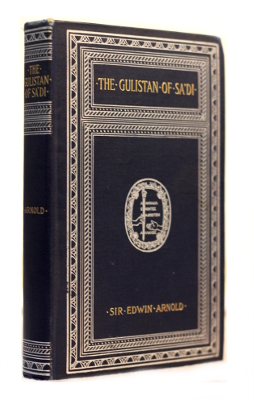Title: The Gulistan of Sa’di
Author: Sa’di, Sir Edwin Arnold (trans.)
Publisher: Harper & Brothers, 1899. First US edition of Arnold translation.
Condition: Hardcover, decorative cloth. Very good. Very minor foxing and tanning to edges. Uncut pages. Very slight fraying to spine. In excellent condition for its age.
About Sa’di (from Wikipedia):
Abū-Muhammad Muslih al-Dīn bin Abdallāh Shīrāzī, better known by his pen-name as Saʿdī, was one of the major Persian poets of the medieval period. He is not only famous in Persian-speaking countries, but has been quoted in western sources as well. He is recognized for the quality of his writings and for the depth of his social and moral thoughts. Saadi is widely recognized as one of the greatest poets of the classical literary tradition.
Gulistan (The Rose Garden) is mainly in prose and contains stories and personal anecdotes. The text is interspersed with a variety of short poems which contain aphorisms, advice, and humorous reflections, demonstrating Saadi’s profound awareness of the absurdity of human existence. The fate of those who depend on the changeable moods of kings is contrasted with the freedom of the dervishes.
Quotes:
The following inscription was upon the portico of the hall of Feridun:
O brother, the world remains with no one.
Bind the heart to the Creator, it is enough.
Rely not upon possessions and this world
Because it has cherished many like thee and slain them.
When the pure soul is about to depart,
What matters it if one dies on a throne or on the ground?
One of the kings of Khorasan had a vision in a dream of Sultan Mahmud, one hundred years after his death. His whole person appeared to have been dissolved and turned to dust, except his eyes, which were revolving in their orbits and looking about. All the sages were unable
to give an interpretation, except a dervish who made his salutation and said: ‘He is still looking amazed how his kingdom belongs to others.’
Many famous men have been buried under ground
Of whose existence on earth not a trace has remained
And that old corpse which had been surrendered to the earth
Was so consumed by the soil that not a bone remains.
The glorious name of Nushirvan survives in good repute
Although much time elapsed since he passed away.
Do good, O man, and consider life as a good fortune,
The more so, as when a shout is raised, a man exists no more.
About Edwin Arnold (from Wikipedia):
Sir Edwin Arnold KCIE CSI (10 June 1832 – 24 March 1904) was an English poet and journalist, who is most known for his work, The Light of Asia, and his translation of the Bhagavad Gita.


